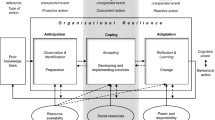Abstract
American organizational theorists have not taken up the call to apply Bourdieu’s approach in all of its richness in part because, for better or worse, evidentiary traditions render untenable the kind of sweeping analysis that makes Bourdieu’s classics compelling. Yet many of the insights found in Bourdieu are being pursued piecemeal, in distinct paradigmatic projects that explore the character of fields, the emergence of organizational habitus, and the changing forms of capital that are key to the control of modern organizations. A number of these programs build on the same sociological classics that Bourdieu built his own theory on. These share the same lineage, even if they were not directly influenced by Bourdieu.
Similar content being viewed by others
Notes
See Randy Hodson’s Workplace Ethnographies Project at http://www.sociology.ohio-state.edu/rdh/Workplace-Ethnography-Project.html.
References
Berger, P. L., & Luckmann, T. (1966). The social construction of reality: A treatise in the sociology of knowledge. Garden City, NY: Doubleday.
Boltanski, L., & Thevenot, L. (2006[1991]). On justification: Economies of worth. Princeton, NJ: Princeton University Press.
Bourdieu, P. (1977). Outline of a theory of practice. Cambridge: Cambridge University Press.
Bourdieu, P. (1984[1979]). Distinction: A social critique of the judgement of taste. (Translated by R. Nice) Cambridge, MA: Harvard University Press.
Bourdieu, P. (1988[1984]). Homo academicus. (Translated by P. Collier) Stanford, CA: Stanford University Press.
Bourdieu, P. (2005[2000]). The social structures of the economy. (Translated by C. Turner) (Cambridge: Polity).
Burt, R. S. (1987). Social contagion and innovation: Cohesion versus structural equivalence. The American Journal of Sociology, 92, 1287–1335.
Burt, R. S. (1992). Structural holes: The social structure of competition. Cambridge, MA: Harvard University Press.
DiMaggio, P. J. (1997). Culture and cognition. Annual Review of Sociology, 23, 263–287.
Dimaggio, P. J., & Powell, W. W. (1983). The iron cage revisited – Institutional isomorphism and collective rationality in organizational fields. American Sociological Review, 48, 147–160.
DiMaggio, P. J., & Powell, W. W. (1991a). Introduction. In W. W. Powell, & P. J. DiMaggio (Eds.) The new institutionalism in organizational analysis. Chicago: University of Chicago Press.
Dimaggio, P. J., & Powell, W. W. (1991b). The new institutionalism in organizational analysis. Chicago: University of Chicago Press.
Dobbin, F. (1994). Forging industrial policy: The United States, Britain, and France in the railway age. New York: Cambridge University Press.
Dore, R. (2000). Stock market capitalism: Welfare capitalism – Japan and Germany versus the Anglo-Saxons. New York: Oxford University Press.
Fay, B. (1990). Critical realism? Journal for the Theory of Social Behaviour, 20, 33–41.
Fligstein, N. (1990). The transformation of corporate control. Cambridge, MA: Harvard University Press.
Fligstein, N. (2001). The architecture of markets: An economic sociology of twenty-first-century capitalist societies. Princeton, NJ: Princeton University Press.
Granovetter, M. (1972). Getting a job: A study of contacts and careers. Cambridge, MA: Harvard University Press.
Granovetter, M. (1985). Economic action and social structure: The problem of embeddedness. American Journal of Sociology, 91, 481–510.
Hofstede, G. (1980). Culture’s consequences: International differences in work values. Beverly Hills, CA: Sage.
Johnson, V. (2006). “What is organizational imprinting? Cultural Entrepreneurship in the Founding of the Paris Opera.” Department of Sociology, University of Michigan.
Kunda, G. (1992). Engineering culture: Control and commitment in a high-tech corporation. Philadelphia: Temple University Press.
Lawrence, P., & Lorsch, J. W. (1967). Organization and environment: Managing differentiation and integration. Boston: Harvard Graduate School of Business Administration.
Leifer, E., & White, H. C. (1987). A structural relations. In M. S. Mizruchi, & M. Schwartz (Eds.) Intercorporate relations: The structural analysis of business. Chicago: University of Chicago Press.
Lukes, S. (1974). Power: A radical view. London: Oxford University Press.
March, J. G., & Simon, H. A. (1958). Organizations. New York: Wiley.
Meyer, J. W., Boli, J., & Thomas, G. M. (1987). Ontology and rationalization in the Western Cultural Account. In G. M. Thomas, J. W. Meyer, F. Ramirez, & J. Boli (Eds.) Institutional structure: Constituting state, society, and the individual. Newbury Park: Sage.
Meyer, J. W., & Jepperson, R. (2000). The ‘Actors’ of modern society: Cultural rationalization and the ongoing expansion of social agency. Sociological Theory, 18, 100–120.
Meyer, J. W., & Rowan, B. (1977). Institutionalized organizations: Formal structure as myth and ceremony. American Journal of Sociology, 83, 340–363.
Nisbett, R. E., Peng, K., Choi, I., & Norenzayan, A. (2001). Culture and systems of thought: Holistic versus analytic cognition. Psychological Review, 108, 291–310.
Perrow, C. (2002). Organizing America: Wealth power and the origins of corporate capitalism. Princeton, NJ: Princeton University Press.
Pfeffer, J., & Salancik, G. R. (2003[1978]). The external control of organizations: A resource dependence approach. Stanford, CA: Stanford University Press.
Podolny, J. M. (2001). Networks as the pipes and prisms of the market. American Journal of Sociology, 107, 33–60.
Podolny, J. M. (2005). Status signals: A sociological study of market competition. Princeton, NJ: Princeton University Press.
Roy, W. (1997). Socializing capital: The rise of the large industrial corporation in America. Princeton, NJ: Princeton University Press.
Vaughan, D. (1996). The challenger launch decision: Risky technology, culture, and deviance at NASA. Chicago: University of Chicago Press.
Weick, K. E. (1979). The social psychology of organizing. Reading, MA: Addison-Wesley.
Weick, K. E. (1993). Sensemaking in organizations: Small structures with large consequences. In J. K. Murnighan (Ed.) Social psychology in organizations: Advances in theory and research. Englewood Cliffs, NJ: Prentice Hall.
Weick, K. E. (1995). Sensemaking in organizations. Thousand Oaks, CA: Sage.
White, H. C. (1981). Where do markets come from? American Journal of Sociology, 87, 517–547.
White, H. C. (1992). Identity and control: A structural theory of social action. Princeton and Oxford: Princeton University Press.
White, H. C. (2002). Markets from networks: Socioeconomic models of production. Princeton, NJ: Princeton University Press.
Whitley, R., & Kristensen, P. H. (Eds.). (1996). The changing European firm: Limits to Convergence. London: Routledge.
Acknowledgments
I thank Michele Lamont for comments.
Author information
Authors and Affiliations
Corresponding author
Rights and permissions
About this article
Cite this article
Dobbin, F. The poverty of organizational theory: Comment on: “Bourdieu and organizational analysis”. Theor Soc 37, 53–63 (2008). https://doi.org/10.1007/s11186-007-9051-z
Published:
Issue Date:
DOI: https://doi.org/10.1007/s11186-007-9051-z




